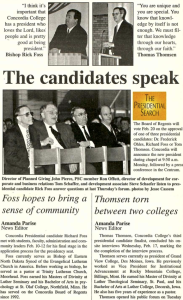In 2011, Concordia hired its 11th president: President William J. Craft. Now, 11 years later, Craft announced his upcoming retirement effective on July 1, 2023.
Concordia’s Board of Regents is starting the process to search for a new president, according to an email sent to campus on Feb. 8, 2022.
Board of Regents chairperson Mary Ranum ‘78 said, “We as members of the board of regents know how important this decision is for the future of Concordia. We know that higher education as a whole faces challenges. We are absolutely committed to finding the best next possible leader who will be committed to Concordia, to its history, and tradition, and also to addressing its challenges to push Concordia forward.”
The search committee will meet Feb. 17 to discuss the schedule of the search. Presidential Search Committee chairperson Rev. Gary Henderson ‘79 estimates the team will consult with students in open discussions held in April to create a presidential profile that will be released in May.
“It’s important that we don’t just listen to our own voices because there are a lot of interested parties and stakeholders in this process. Going forward, there will be lots of opportunities to listen and to learn so that as we create the profile of the next president, it is really reflective of our community and what vision we have for the future,” Henderson said
The Board of Regents also announced the search will be a closed process with public discussions of candidates in early April. According to the email, Concordia is consulting with the Academic Search firm and both parties agreed a closed search will allow for candidates to pursue Concordia’s presidency without risking current positions of employment.
“Individuals who currently have senior positions at other colleges would not be willing to put their name into our pool for this position if this was public. It was the judgment of the board of regents and the agreement of our search consultants that we made this a closed process,” Ranum said.
According to Higher Ed Dive, search firms are becoming more widely used by colleges and universities. Judith Wilde and James Finkelstein tracked the number of presidential ads and mentions of search firms in The Chronicle of Higher Education for 50 years. In 1995, only 28% of ads named a search firm. Twenty years later, 92% of the advertised presidential searches included the name of an executive search firm or consultant.

Concordia chose to partner with Academic Search after considering four agencies that were recommended by previous presidents.
“We wanted folks who not only knew what they were doing, but were also sensitive to the challenges and needs of Lutheran higher education,” Ranum said.
Wilde also found in her research that colleges and universities which partner with search firms are more likely to conduct closed searches based on the speculation that confidentiality is necessary to attract the best candidates, per her article in Inside Higher Ed.
The last public search at Concordia was held in 1999, which led to Thomas Thomsen being elected as Concordia’s ninth president. The campus was involved in making the presidential profile and frequently updated; after the committee searched and narrowed down candidates, students were able to publicly meet and speak with the three finalists.
This is Concordia’s third time conducting a closed search process since the first held in 2003. During closed processes, as with Jolicoeur and Craft, students help make the profile and then can attend open meetings with the sole finalist near the end of the process.
The fear of public processes is that publicizing the names of candidates can jeopardize gifts to the college and can also lead to a more difficult to obtain state funding for public schools, said Jan Greenwood for Inside Higher Ed.
Wilde said candidates face three possibilities if they do not get hired: stay with the employer, stay if the employer incentivizes the position, or the university terminates the candidate’s position.
Oftentimes when a college or university incentivizes the position or buys out a president’s contract, the president receives a hefty compensation and it costs the college a large amount of money.
“In the end, the only ones to pay the price for secrecy are the colleges and universities of the sitting president. The candidates themselves have nothing to lose and quite possibly a great deal to gain,” Wilde wrote for Higher Ed Dive.
Of the 13 colleges in MIAC, eight colleges have conducted presidential searches within the past two years, Concordia being one. While nearly split between public and closed searches, a majority have used search firms to aid in the process.
